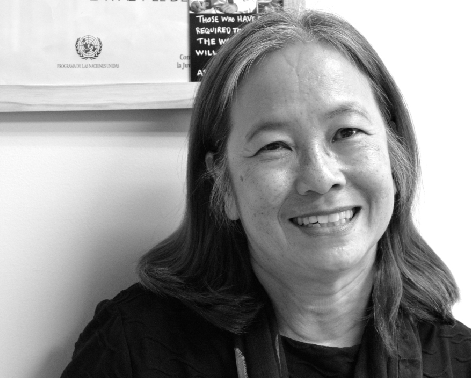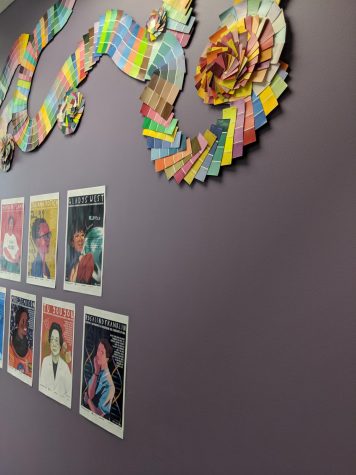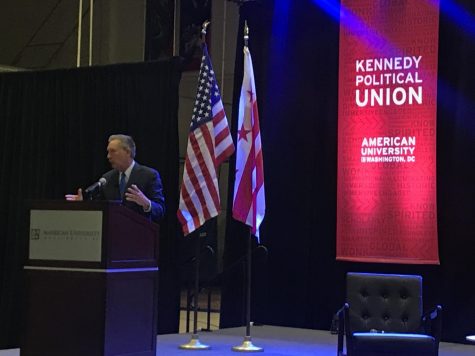THE FEMINIST ECONOMIST: Maria Floro

Maria Floro is a professor of economics at AU and the co-director of the graduate program for gender analysis in economics. She recently co-authored a book with two other feminist economists called “Gender, Development and Globalization.” Her professional research focuses on gender in the developing world.
What led you to study gender and economics?
I became interested in gender because when I completed my PhD program, I realized that a lot of the discussion and analysis doesn’t take into account certain contributions of women. This is just an important observation that was reinforced as I took more courses. When I wanted to do a dissertation, obviously it was going to be in one of the fields that my graduate school was offering. But I wanted it to be something through which gender issues were addressed, and they told me to try demography. So I actually did demography, but I felt that gender was just beyond the question of population. That really piqued my interest.
Your native country is the Philippines. Did you have any experiences there that inspired your studies?
Yes, in the Philippines there was a growing women’s movement. I was aware of the demands of Filipino women for gender equality. What’s interesting is that in the Philippines if you look at some of the social indicators, women are doing fairly well compared to other women in the developing world. Things are changing now, but when I was growing up I thought the women’s movement was raising the important issues of the time, and there are many economic issues regarding women that have to be addressed. And I didn’t see any discussion in economics on those important matters. So I felt that one thing I would like to do in my research,and also in my teaching, is incorporate the gender dimension and raise questions.
Were you directly involved in the women’s movement in the Philippines?
No, I was in America already, but I read a lot of their work. I’m very interested, because I grew up in the Philippines and I’ve always felt that any research I do should address the concerns of people in the developing world. And certainly, the concerns and experiences of women is something that I’m very passionate about. So I read, and I was lucky enough that some of my research has taken me to do some fieldwork in the Philippines, as well as in other developing countries.
You have co-authored a forthcoming book Gender, Development, and Globalization. Could you talk about the work that went into writing it?
There are three feminist economists [who] are writing that. That book was originally written in 2003 by Lourdes Benería. She asked me a few years ago if I would be interested in revising the book with her because many things have changed since then. The issues raised in 2003 are pretty much the same as the issues raised today, but with more nuances today. We need to take into account that issues between women and men today are mediated by their class, their race or ethnicity, their situation in the labor market and so forth. I really learned a lot from writing that book with Lourdes Benería and our third co-author, Gunselli Berik.
What is your greatest takeaway from co-authoring “Gender, Development, and Globalization”?
First, many things that I taught and had been convinced of were challenged as I looked for more facts. Second, I was writing parts of that book from the perspective of women in the developing world. One of my co-authors is originally from Turkey and is not allowed to work in trade. The other now lives in Spain, and after retiring from Cornell University, and as one of the first feminist economists is particularly looking through a gender lens at the current crisis that Spain, Greece and other parts of Europe are experiencing. As we read each other’s pieces while writing the book, we noticed a sense of commonality among the issues. Regardless of whether you’re talking about women farmers in Africa, the unemployed graduates in Spain or the garment workers in Turkey, there is a sense of commonality in terms of what they are experiencing. So that sort of strengthened and reinforced our views on the importance of gender. It also showed that while there has been so much progress, so much still has to be accomplished.
One other thing I got out of writing the book is that no matter how much you push knowledge in pursuit of promoting gender equality, you could not accomplish the strategic change that is necessary in policy without collective action (i.e. the women’s groups). And that collective action also must involve other economists and other activist groups, such as the environmental group.
I know you’ve done a lot of research in developing countries. Could you describe the fieldwork?
I always like to talk to the people whose behaviors and choices I am studying. Fieldwork is very important for me. The quality of the information is so important, and it provides you with a lot of invaluable insight. I also like doing collaborative work when working with developing countries. For example, if it’s not feasible for me to spend all of my time doing field work because I teach and do the writing, the collaboration with local researchers and local organizations is very important. They provide me with the context in which my study is being conducted. Right now I am doing some work on analyzing time use data for China, Mongolia and Thailand. I am lucky to have teams from those countries themselves to collect the data.
Can you recall any experiences when doing fieldwork that were especially important or changed your mindset?
Each time I go and talk to the subjects of my study, I have always felt that hearing from them directly either challenges your own prior beliefs or reinforces some of your beliefs, but it doesn’t leave your belief the same. It enriches it in some way, either because there are some nuances that you didn’t take into account, or that you didn’t anticipate that there could be some underlying concern of a particular person. The one nice thing about doing fieldwork is that you get a far richer explanation of what is going on. You may not be able to explain it all in your work, but you’ll have a deeper understanding of the question or issue that you’re examining.
What is one thing that AU students may not know about the field of economics?
It’s an exciting field. It’s a field that has a lot of influence, especially in the area of policy. It has an important role in shaping policy, it provides a lot of tools for using ever-growing information. However, economics does not have one common or single view. Students that take economics should feel free to explore the various perspectives and schools of thought that make this discipline rich. I encourage students to learn the tools of analysis, but also to keep an open mind, to maintain their abilities to think critically, and to question what seems to be written in stone. Very few things are written in stone in economics, because it is a social science after all.






